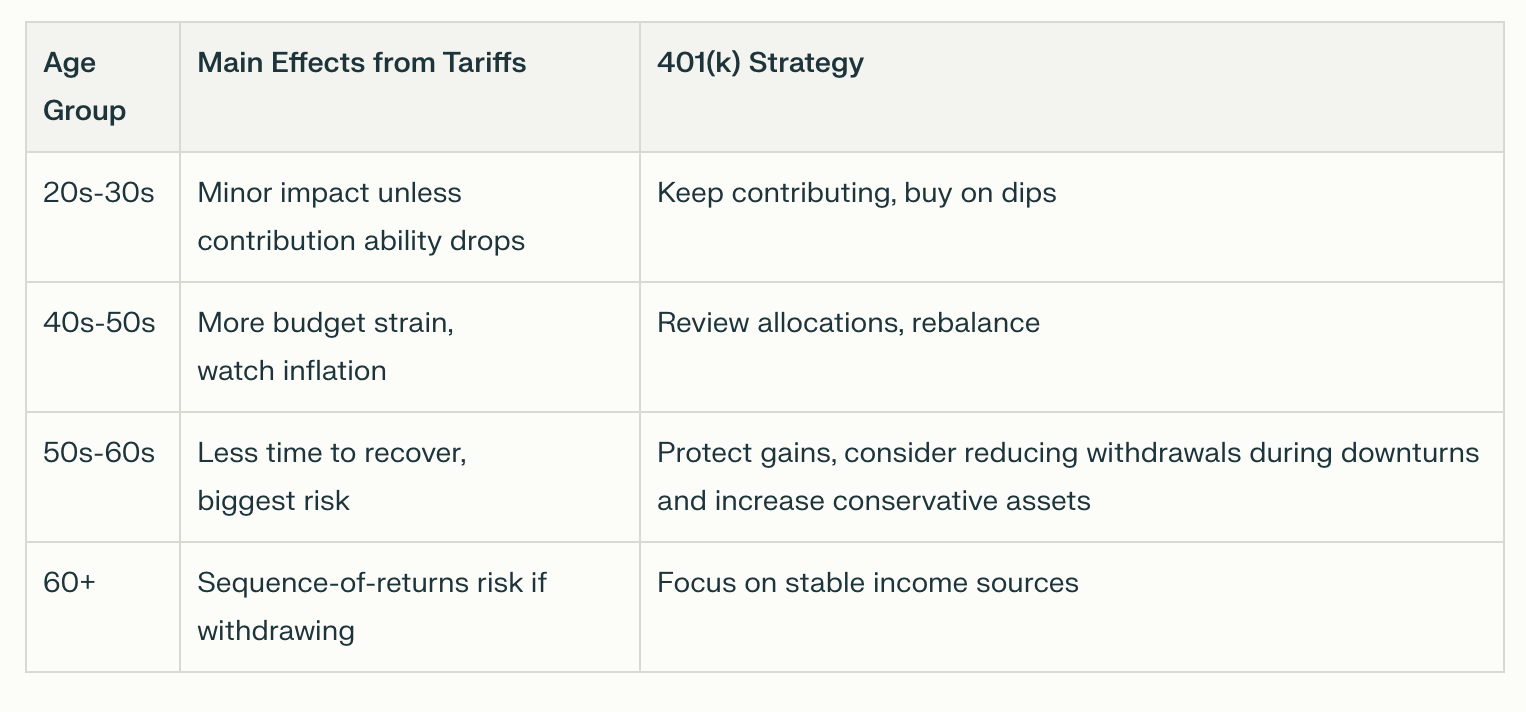
In 2025, the U.S. introduced new tariffs and import taxes, and many of us have felt the ripple effects—especially when it comes to our retirement savings. If you’ve been wondering what’s going on with your 401(k), here’s a straightforward look at what’s happening and what it could mean for your future.
1. Increased Market Volatility
- Stock markets have been on a bit of a rollercoaster ride since the new tariffs were announced. In April, for example, the S&P 500 dropped 6%, the Nasdaq wasn’t far behind, and the Dow Jones lost 2,000 points in just a week. If you checked your 401(k) during that time and saw your balance drop, you’re definitely not alone.
- Some sectors—like technology and manufacturing—have been hit harder than others because they depend heavily on global supply chains. When big companies like Apple take a hit (and Apple is in a lot of 401(k) funds), it can drag down your retirement account even more.
2. Short-Term Losses, Long-Term Uncertainty
- If most of your 401(k) is invested in stocks—whether in the U.S. or overseas—you’ve probably noticed your balance dip lately. You’re not alone; a lot of people are seeing lower balances or slower growth compared to previous years.
- For younger folks, these ups and downs are usually just temporary setbacks, and there’s plenty of time to recover. But if you’re getting close to retirement, these market drops can feel a lot more stressful, since there’s less time to bounce back.
3. Inflation and Cost-of-Living Pressure
- Tariffs work like extra taxes on imported goods, so you might notice prices creeping up on everything from groceries to electronics. When the things you buy every day cost more, it can be tougher to save for retirement.
- Higher prices also chip away at the real value of your 401(k) savings and what you’ll be able to afford in the future. That’s why it’s important to keep inflation in mind when you’re planning how much you’ll need in retirement.
4. Behavioral Shifts and Advice
- With markets swinging so much this year, a lot of people are changing up their 401(k) accounts—sometimes out of fear. But most experts agree: it’s usually best not to panic and sell when things are down. Selling at the wrong time can make those temporary losses permanent.
- The tried-and-true advice still applies: keep your investments diversified, review your allocation periodically, and stick to your plan—especially if retirement is still years away.
5. Sector and Age-Specific Effects

6. Expert Tips for 401(k) Investors
- Stick with your investments. Sudden market drops from tariffs can bounce back over time.
- Review your mix. If tariffs hit certain sectors (like tech or manufacturing), ensure your portfolio remains aligned with your long-term goals.
- Think about inflation protection. Assets like TIPS can help guard your retirement savings against rising prices.
- Talk to a financial pro. They can help you figure out how to handle market swings and inflation, especially if retirement is on the horizon.
Tariffs have made things feel more unpredictable in 2025—both in the markets and in our day-to-day lives. But having a good plan for your 401(k) and sticking to it is still your best bet. Try not to let emotions take over, check your account every so often, and keep your eyes on long-term growth.
Disclaimer:
This article is provided for informational and educational purposes only and does not constitute investment advice, an offer, or a solicitation to buy or sell any securities or financial products. The information herein is not intended to be used as the primary basis for investment decisions, nor should it be construed as advice designed to meet the particular investment needs of any specific investor.
Readers are encouraged to consult with a qualified financial adviser, tax professional, or legal counsel before making any investment or retirement planning decisions. The views expressed are subject to change without notice and may not reflect the views of any company, organization, or institution mentioned.
All investing involves risk, including the potential loss of principal. Past performance is not indicative of future results. Certain statements contained in this article may be forward-looking and are subject to various factors and uncertainties that could cause actual results to differ materially from expectations.
Nothing in this article is intended to suggest that any particular investment, security, portfolio, or investment strategy is suitable for any specific individual.
Sources:
- https://time.com/7275216/is-your-401k-affected-by-trump-tariffs-what-you-should-do/
- https://www.newsweek.com/americans-are-worried-tariffs-will-impact-their-retirement-2065659
- https://www.cnn.com/2025/05/31/economy/tariffs-apple-401k-savings
- https://www.sfchronicle.com/personal-finance/article/trump-tariffs-401k-impact-20257030.php
- https://www.wiseradvisor.com/blog/investment-management/impact-of-new-tariffs-on-your-401k-by-age/
- https://www.uc.edu/news/articles/2025/05/how-are-tariffs-impacting-your-retirement-plans.html
- https://www.guideline.com/education/articles/markets-and-tariffs-in-2025-what-retirement-investors-should-know
- https://www.forbes.com/sites/stevevernon/2025/04/10/how-president-trumps-tariffs-could-impact-your-retirement/
- https://www.newfront.com/blog/tariffs-and-retirement-readiness
- https://money.usnews.com/investing/articles/how-will-tariffs-affect-your-investments












